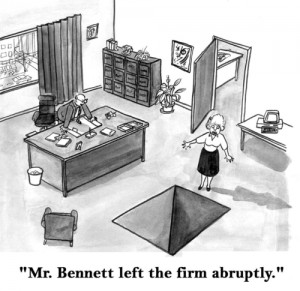Special to the Financial Independence Hub
Sudden retirement syndrome is not a real medical condition as far as I’m aware but for me it best describes the shock of withdrawal that occurs when a person leaves their corporate job.
This can occur through either downsizing, formal retirement or can even occur when a person is leaving after many years spent with the Corp to do something else.
The shock from going unprepared from a busy work-life to nothing can be very stressful and in extreme cases can even result in premature death. We all have heard stories of people in retirement who lost their motivation to do much of anything, started drinking heavily, and died within a short time.
I’ve known quite a few people who have suffered from SRS. My father suffered through it, a close friend died because of it, and I even had a taste of it after leaving my corporate job of 36 years — which is crazy in itself because I already had a game plan in place for my next move. I clearly remember the ringing in my ears, the feeling of uncertainty, the feeling of living in a fog for a period of time. It’s hard to break away from something that has become a piece of you over the years.
It’s important to note that not everyone will suffer from SRS. People who are able to detach themselves successfully from work when they walk out the door are usually spared. An example would be an assembly line person who is able to leave their job when the whistle blows and not think about work until the next day. While an assembly line worker may be burned out physically and mentally, as they are not challenged intellectually, the Corp does not own their soul, unlike corporate executives who are linked to their work 24/7 and whose self-identity is tied to the job that just ended.
Retirement shock can be hell
Deciding to retire or having someone decide it for you is one of the single biggest life changes a person will go through.
When you think about, retirement is a kind of loss: loss of your structure and role, loss of control, loss of social status, and loss and personal relationships. It may be a happy or sad loss, but the fact that something to which you devoted so much of your life is removed results in a significant personal loss. For some it will feel like a death of sorts, death of one’s corporate identity: many retirees feel “junked” and the truth is that retirement shock can be hell for many people.
Eventually you start to feel alone, as the stress and anxiety builds because no one seems to understand what you are going through. Most people can’t help because they can’t relate to why you are not happy when you don’t have to go to work anymore. In fact most people are envious of your newfound leisure. What you are going through just doesn’t make sense to them. You need to talk to someone who can relate to you and your problem — preferably someone who has experienced what you are experiencing.
Alleviating Stress and Depression
Most times stress can be alleviated by removing the external stressors like a bad boss or excessive demands at work but with Sudden Retirement Syndrome there is no external stressor to remove as the stress comes from within ourselves. If we cannot find a way to manage this stress, depression will eventually set in and depression is a very bad thing.
Depression robs you of your energy, vitality and self esteem and generally leads to poor health. Depression is usually experienced as an unrelenting sad mood, an absence of energy, problems of concentrating or remembering, a loss of interest in activities once enjoyed and difficulties with sleeping and eating.
The degree of SRS can be mitigated by a person’s degree of preparedness. We need to be aware of the emotional challenges we could face and become ready both financially and psychologically if something unexpected happens. The shock from going unprepared from an overachieving life to nothing can be very stressful.
One of the best ways to alleviate SRS is to find ways to occupy your free time. I remember when my father retired. The first year was brutal for him (and those around him) until one day when my mother handed him the want-ad section of the newspaper with some jobs circled. She had had enough and knew my father needed to get involved again, to feel that he mattered.
So here was a former manager of an accounting department delivering pet food door to door for Global Pet Foods. I remember laughing when I found out about it but he really enjoyed his time there and the owner was happy to have a responsible employee working for him. It was a win-win, he was very happy and it was never about the money.
Everyone needs to create and maintain their own version of an escape pod in case of emergency. You need to be prepared mentally and financially and have a game plan in case of emergency. Having a lifestyle plan in place in many ways is like having a life preserver.
There will always be some stress with leaving the Corp but it will be a lot less if you view leaving as an opportunity to again be free to find purpose and recreate yourself. It’s all about having the right attitude and looking at the change as positive. If you find something to replace the loss with, something that gets you excited, odds are you will find this to be one of the happiest periods of your life.

Mike Drak is part of the Komitas Mastromartino Wealth Management Group at RBC Dominion Securities, based in Toronto. He is currently writing a book with Jonathan Chevreau about some of the themes mentioned in the above blog and at the Financial Independence Hub in general. He can be reached at michael.drak@yahoo.ca.



